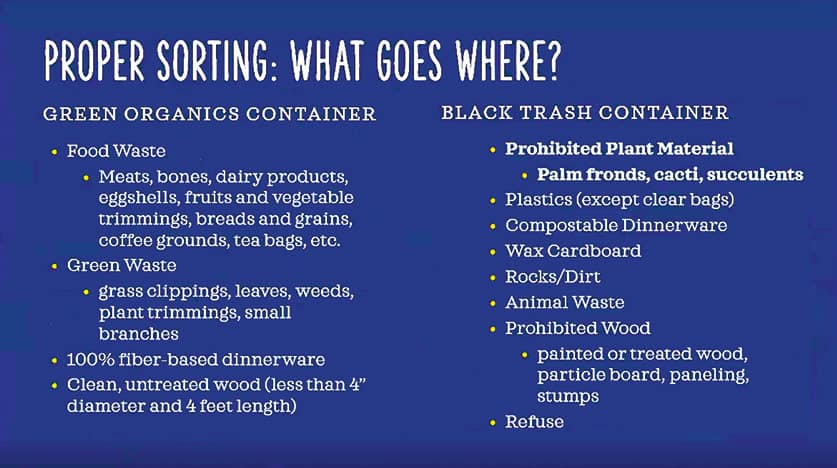City pilot composting program to comply with state mandate

by Steven Felschundneff | steven@claremont-courier.com
The Claremont City Council recently approved an organic recycling pilot program, which is the first step in complying with a new state law mandating composting of food waste by January 2022.
Approximately 1,420 households—17 percent of residential customers—will participate in the pilot program by placing food scraps in their green waste bins beginning February 1. The pilot program will cost the city approximately $40,000 including processing and hauling costs, as well as purchasing countertop containers. The city has funding available in its sanitation budget to cover these costs.
Participants in the pilot program will all be on a single route on the four collection days, Monday through Thursday. The routes were selected based upon clearly defined boundaries and staff’s ability to collect a full route of organic waste in a single truckload, as well as an effort to select a representative sample from various areas of the community.
The new law, SB-1383, requires that all cities adopt a composting program, and failure to meet the January 2022 deadline could result in significant fines.
“Recycling food and organic waste helps to reduce harmful methane emissions that contribute to global warming, and is consistent with the goals of the Sustainable City Plan. The pilot program will allow select customers to place food waste in their green container for composting,” acting City Manager Adam Pierre said in a statement.
City staff decided to go with comingled green and food waste to eliminate the need for a fourth curbside collection bin and to avoid creating a fourth refuse pick up route, which would include hiring drivers and purchasing trucks, according to a presentation provided by Kristin Mikula, community services manager.
The lowest bid came from Athens Services which is permitted to accept comingled green and food waste and produces high grade compost, according to the staff report. The city would be responsible for collection of the material and delivering it to the Athens’ facility in the City of Industry. Athens would then truck the waste to its composting plant in Victorville. Composting on this scale is still a new and emerging industry, with few facilities having the proper permits, including the city’s current contractor in Pomona which cannot receive comingled food and green waste.
The pilot program will help the city evaluate hauling times to the City of Industry, including vehicle fuel and maintenance, the amount of food waste collected and the contamination rate. The goal is to estimate a budget preparation for rollout of the full program next year.
The full program will cost $85 per ton of waste, which is significantly less than the next bid of $97 per ton. The city estimates that customers will produce 8,500 tons per year for a total cost of $722,500 annually. Additionally, there could be a charge of $8.50 per ton if contamination of the load is greater than five percent. Contaminates include items that should go in the trash, such as painted or treated wood, cactus, pet waste or other non-compostable materials.
Staff recommends that the Athens agreement not to exceed contract value of $850,000 per year. They are recommending entering into a five-and-a-half year contract with Athens to lock in the current rate. The current budget to process green waste is $566,660, resulting in a budget shortfall that will need to be addressed when the city prepares its budget for next year.
The biggest change for residents will largely be behavioral, learning to put food waste in the green bin. Ms. Mikula also said that some residents might be concerned about creating a mess that could attract vermin or produce odors. The contractor has agreed to allow food waste to be placed in clear plastic bags for consumers who are worried about cleanliness. In addition, residents can request a countertop container to make collecting food waste easier.
“We are simply taking a waste product that’s in the black container and relocating it to the green container,” Ms. Mikula said.
During public comment, several people including Stuart Wood, executive director Sustainable Claremont, expressed concerns about the quality of the soil produced by Athens and highlighted the local composting program offered by Sustainable Claremont. Mr. Wood also expressed concern about the plastic bags that would end up in a landfill. Other commenters wondered if the contract was too long, given that this is an emerging industry and expressed skepticism that Claremont would ever see any of the soil that Athens produced.
Ms. Mikula responded that the city would educate the community on ways to avoid the bags, such as layering food waste with green waste, and said the contract had flexibility so if a local composting program became viable option, the city could use that service as well.
Robert Phillips, director of organics at Athens Services, said the soil his company produces is tested regularly by a third party lab to ensure its quality and is purchased by large farms, including producers of grapes, hemp, citrus, pistachio and almonds.
“We have an extremely high quality compost and we have very large growers as our customer base,” Mr. Phillips said. “We would love to talk about full loop programs that would bring some of this compost back to the community.”
Councilmember Corey Calaycay said it seemed to defeat the purpose of mitigating the methane gas produced from food waste if the same waste was trucked 70 to 100 miles to the facility in Victorville. He also proposed charging customers a modest fee for the countertop collection bucket.
Pilot program participants will receive information by mail and instructions regarding proper sorting. After December 31, 2021, the program will be expanded to serve all Claremont single-family customers. Residents with questions regarding the pilot program are encouraged to contact the Community Services Department at (909) 399-5431.










0 Comments